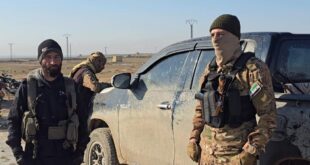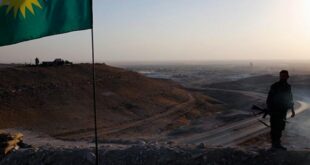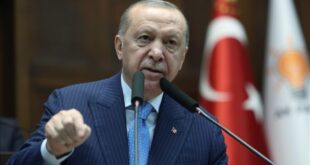Turkish President Recep Tayyip Erdogan confirmed Tuesday the deaths of two Turkish soldiers in Libya, where Ankara has military forces in support of the internationally-backed government in Tripoli. Word of the losses comes as the Turkish opposition steps up pressure against Erdogan’s Libya policy.
“We have two martyrs there in Libya,” Erdogan told reporters ahead of an official visit to Azerbaijan. The Turkish president gave no details of where, how, or when the deaths occurred.
In January, Ankara started deploying military personnel to Libya in support of the Tripoli-based Government of National Accord. The GNA has been under sustained attack from forces led by Libyan General Khalif Haftar, who has a power base in eastern Libya. Haftar’s Libyan National Army, or LNA, has the backing of countries such as the United Arab Emirates, Egypt and Russia.
On Saturday, Erdogan was quoted as saying, “In return for a few martyrs,” Turkish forces had killed 100 fighters from Haftar’s forces.
In a possible sign of sensitivity over Libya, Erdogan angrily chastised a reporter and his organization for asking for clarification on the number of soldiers killed in Libya. “Quit producing fake news,” said Erdogan, adding, “I am not interested in what the opposition says.”
Growing pushback
The leader of Turkey’s main opposition CHP, Kemal Kilicdaroglu, strongly opposes the Turkish deployment, saying Ankara is falling into a “quagmire.” Kilicdaroglu has been pressing Erdogan on the precise number of Turkish deaths in Libya.
“I’ve said this many times, the hair of our soldiers is more valuable than not only Syria but also Libya,” Kilicdaroglu told his parliamentary deputies Tuesday. Turkey also has a military presence in Syria.
Erdogan vigorously defends the Libya military deployment as one of strategic importance to Turkey. Ankara has not only signed a memorandum of understanding with the GNA to ensure the GNA’s defense, but Ankara has also inked an agreement that grants it control of a critical swath of the eastern Mediterranean Sea.
“The key is to make sure the Tripoli government survives and that the whole country does not come under Haftar’s control,” said Haldun Solmazturk, head of the 21st Century Turkey Institute, an Ankara-based research group.
With growing political pushback over his Libya policy, Erdogan has been citing Libya’s historical and religious links to Turkey.
He increasingly stresses that Libya was a part of the Ottoman Empire and that a sizable Turkish minority still lives in the country.
Syrian rebels
Ankara is relying heavily on Syrian rebels to support a limited Turkish military presence in Tripoli. “For some reason, regular army forces are kept on the side, and he [Erdogan] deploys mainly these Syrian rebels instead, maybe to avoid martyrs given the public sensitivities over the operation,” said analyst Atilla Yesilada of Global Source Partners.
Erdogan confirmed Tuesday the use of militias in Libya operating under the umbrella of the Syrian National Army, or SNA. The Turkish-backed rebel group is active in parts of northern Syria. The SNA is the main group participating in a Turkish-led offensive in northeast Syria.
“Those going from Syria, from the Syrian National Army, they have a common goal. They are there within the framework of these common goals,” Erdogan said, adding, “Our brothers who are with us in Syria see being there with us as an honor.”
Turkey has deployed more than 3,000 Syrian rebels to Libya since January, according to the Syrian Observatory for Human Rights, a monitoring organization.
According to local media reports, Turkey is paying Syrian rebels around $2,000 a month in comparison to around $100 for fighting in Syria.
Turkey relied heavily on Syrian rebels in a December operation in Syria against Kurdish militia forces of the YPG, which Ankara designates as a terrorist organization linked to an insurgency in southeastern Turkey.
The militia’s capabilities, however, remain in question for an operation as complex as Libya. “They [Syrian rebels] lack training, they lack discipline, they lack proper military motivation and proper command and control,” said Solmazturk, who is a retired general.
“They have seldom felt a real military threat,” he added. “They’ve always had strong Turkish military support behind them, air, tanks artillery. They have not been put to a real military test. Libya would be the first military operation where its military capabilities would be put to the test.”
International pressure
With Libya 2,000 kilometers from Turkey, Turkish forces in Tripoli have limited logistical support or heavy weapons. On Sunday, Khalid Al-Mahjoub, spokesman for Haftar’s Libyan National Army, said 16 Turkish soldiers were killed in the port city of Misrata in the past few weeks. Haftar’s forces also claimed to have sunk a ship carrying Turkish munitions. Ankara refuses to comment on the claims.
“In Libya, Wagner forces sent by Russia are making life quite difficult for groups supported by Turkey,” said Mehmet Ogutcu of the London Energy Club policy group. The Wagner Group is a private security force run by Yevgeny Prigozhin; a businessman reported to have close ties with Moscow. The Kremlin denies the troops are financed by Moscow.
Ankara also is facing growing international pressure over Libya. Last week, Josep Borrell, the new European Union high representative for foreign affairs and security policy, said member states had agreed to an operation to monitor the Mediterranean to enforce a United Nations Libyan arms embargo.
The EU initiative is interpreted by Ankara as being aimed at its military support of the GNA, given most of Turkey’s supplies are shipped by sea. Haftar’s forces are primarily supplied by land. Ankara insists it is within its rights to support the U.N.-recognized GNA.
A source close to the Turkish military says that given the number of sophisticated weapons already deployed in Tripoli, it will be sufficient to resist any attempt by Haftar to seize the Libyan capital.
Ankara is seeking a diplomatic settlement to the Libyan civil war, which ensures the survival of the GNA and the agreements made with Turkey, experts say.
 Eurasia Press & News
Eurasia Press & News



